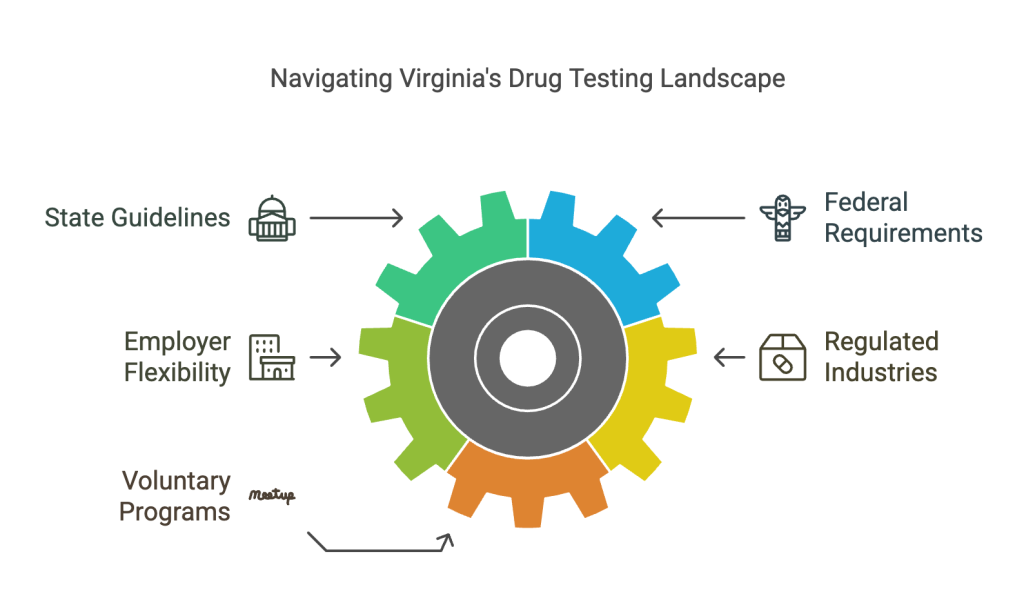In the landscape of employment, striking a balance between ensuring a safe, productive work environment and maintaining fair hiring practices is key. Virginia's drug testing laws play a critical role in this balancing act. Understanding these regulations can help employers, HR professionals, and job seekers navigate the complexities of employment screening with confidence.
Key Takeaways
- Virginia's drug testing laws shape employment practices and must align with both federal and state standards, affecting both employers and job seekers.
- Employers in Virginia aren't required to drug test, but industries like transportation must comply with stringent federal requirements.
- Drug testing includes pre-employment, random, reasonable suspicion, post-accident, and return-to-duty tests, complementing background checks for a comprehensive employee assessment.
- Employers must ensure drug testing policies are fair, consistent, and transparent to avoid potential legal issues and discrimination claims.
- Changing societal attitudes and legal norms, particularly around marijuana use, mean employers in Virginia need to stay adaptable in their recruitment and retention strategies.
Introduction
Virginia's drug testing laws significantly shape employment practices, affecting how employers conduct background checks and the decisions job seekers face. These regulations aren't just legal red tape; they're frameworks that define boundaries for both employers and potential hires. They influence who gets hired and who stays employed, making an impact on workplace culture and productivity.
The focal point of this discussion is understanding these laws in Virginia. How do they align with federal standards like the ADA and EEOC guidelines? How do they integrate with various components of employment background checks? This article will dissect these questions, offering tangible insights for employers eager to adhere to the law and job seekers trying to navigate the system. By understanding these regulations, you can better prepare for the implications they have on hiring processes, policies, and everyday workplace dynamics.
Overview of Virginia Drug Testing Laws
Navigating Virginia's drug testing laws requires a clear understanding of both state-specific guidelines and federal requirements. At the heart of Virginia's approach is a focus on aligning with federal mandates like the Americans with Disabilities Act (ADA) and Equal Employment Opportunity Commission (EEOC) guidelines. This ensures that while employers conduct necessary screenings, they're also mindful of protecting individual rights.

Virginia doesn't mandate drug testing for private employers, giving them flexibility. However, if you're in an industry regulated by federal laws, like transportation or healthcare, you'll face more stringent requirements. The ADA and EEOC emphasize that drug tests should be fair, consistent, and non-discriminatory.
Virginia has also rolled out voluntary programs like the Drug-Free Workplace initiative. This encourages employers to maintain safe environments without mandatory regulations, providing guidelines that foster productivity and security. Participating employers may receive incentives, such as insurance premium discounts, which can be beneficial.
In regulated industries, such as transportation, strict testing protocols are common. For example, if you're operating commercial vehicles, you'll need to adhere to federal drug testing standards, including pre-employment and random screenings. This heightens safety measures and ensures compliance with both state and federal laws.
Understanding these laws is crucial for any employer or job seeker in Virginia. Employers need to create policies that reflect both state and federal standards. For job seekers, knowing your rights and the landscape can prepare you for what to expect during the hiring process. Consider how these laws influence your workplace policies or job searches, and whether you're fully prepared to navigate their complexities.
The Role of Drug Testing in Employment Background Screening
Drug testing plays a crucial part in the employment background screening process. It serves as a tool to ensure workplace safety and productivity. There are various types of drug tests used by employers: pre-employment, random, reasonable suspicion, post-accident, and return-to-duty.
Types of Testing
Pre-employment drug tests are standard and typically conducted after a job offer is made. These tests help employers make informed hiring decisions. Random drug testing keeps employees on their toes, enhancing compliance and deterring drug use. Reasonable suspicion testing is carried out when there are observable signs of impairment. Post-accident tests determine whether drugs were a factor in workplace incidents. Return-to-duty tests are applied before rehiring or reinstating after a policy violation.
Integration with Background Checks
Drug tests complement various background checks by providing a more comprehensive view of a candidateâs suitability. While criminal record checks assess past behaviors, drug tests help predict future reliability and safety in the workplace. Together, they create a full picture that aids in making well-rounded employment decisions.
Technology in Testing
Advancements in drug testing technology enhance both accuracy and efficiency. For instance, instant drug test kits and electronic chain-of-custody forms simplify the process. These innovations minimize human errors and speed up results. As technology evolves, expect more precise testing methods that reduce false positives and improve employers' confidence in screening processes. Understanding and leveraging these improvements is key to navigating the dynamic landscape of Virginia's employment drug testing scene.
Legal Considerations for Employers
Virginia laws allow employers certain rights when it comes to drug testing, but they also impose specific obligations. As an employer, you can implement drug testing, but it's crucial to comply with both state and federal regulations. Virginia doesn't require drug tests for all jobs, but you need to check whether your industry has specific mandates, like those for transportation or healthcare.
Under Virginia law, as an employer, you have the right to conduct drug tests as part of the hiring process or during employment. However, consistency and fairness are non-negotiable. Your policy should outline when and how tests are conducted and ensure it's applied equally to all employees. Clear communication is vital. This transparency builds trust and wards off potential discrimination claims.
Federal laws, like the Americans with Disabilities Act (ADA) and guidelines from the Equal Employment Opportunity Commission (EEOC), still apply. Your testing policy cannot infringe on these protections. For instance, you cannot single out individuals for testing based on assumptions tied to disabilities. Referencing EEOC guidelines can provide clarity in maintaining these boundaries.
Drafting a compliant policy might seem confusing, but the investment pays off. Legal compliance in drug testing not only protects you from potential lawsuits but also fosters a fair workplace. If you're unsure about any aspect, consulting with a legal expert specializing in employment law can be a smart move.
Impact on Employers and the Job Market
Drug testing laws in Virginia can significantly influence how companies approach recruitment and employee retention. By implementing drug testing policies, employers often aim to ensure safety, improve productivity, and protect the company's reputation. But these policies can also pose challenges.
Recruitment strategies can be impacted by drug testing laws, particularly in industries with labor shortages. Some potential hires may be deterred by mandatory testing, reducing the talent pool. A 2020 survey found that 56% of employers in Virginia saw a decrease in applicants after instituting drug testing policies. Balancing thorough screening processes with attracting talent can be a delicate dance.
Employee retention is another area affected. While drug testing can promote a healthy workforce, overly rigorous approaches may breed discontent. For some employees, testing can feel intrusive, leading to higher turnover rates. However, firms that communicate their policies transparently and maintain supportive work environments often see better retention rates.
Consider a local manufacturing plant in Richmond. After experiencing high turnover, they revamped their drug testing policy. By offering support programs and clear communication, they cut turnover by 15% in a year. Lessons from such cases highlight the importance of balancing firm policies with employee support.

Looking ahead, Virginia's job market by 2025 may witness shifts due to evolving legislation and societal attitudes toward drug use. With marijuana now legal in the state, employers may need to adjust policies to align with new norms. Employers who remain adaptable and responsive to changes will likely lead in recruitment and retention, setting a precedent in the competitive job market. Are your current strategies ready for these shifts?
Job Seeker Perspectives
Navigating the hiring process can be tricky, especially when drug tests come into play. It's crucial to understand your rights as a job seeker in Virginia. Employers can request drug tests, but they must follow state and federal regulations. You're entitled to know the testing procedures and the substances they screen for. Transparency is not just a courtesy; it's your right.
Preparation is your best ally. If you expect a drug test, consider reviewing your personal medical history. Some medications can impact the results. Knowing this ahead of time helps you discuss any concerns with your potential employer. Being upfront can save you from misunderstandings down the line.
What happens if the results aren't what you expected? A positive test isnât the end of the road. You have the right to confirm the results with a secondary test. Understand the steps you can take to address the situation. Ask about retesting options or medical review processes. Employers in Virginia are required to maintain confidentiality and fairness throughout this process.
Knowledge is power. A clear understanding of your rights and options during drug testing can turn a daunting task into just another step in the hiring journey.
Social Implications
Drug testing laws can have profound social implications, particularly regarding equity across different demographics. When organizations implement these laws, they must be mindful of potential biases that could disproportionately affect certain groups. Data shows individuals from minority communities often face more significant hurdles when policies aren't applied fairly. For example, false positives or selective enforcement can unfairly impact candidates from these communities, leading to reduced job opportunities.
Societal attitudes toward drug testing also play a crucial role in how these laws evolve. Many people still question whether drug testing is an invasion of privacy or a necessary safety measure. This divide in public opinion can drive legislative changes. Surveys have shown that while some support stringent drug testing as a way to ensure workplace safety, others argue it discriminates against those with past criminal records or medical conditions like prescribed cannabis use.
Navigating these societal perspectives and implementing fair practices requires a balanced approach. Employers need to understand the broader impacts of these tests and strive to create an environment that fosters both safety and inclusiveness. Thoughtful consideration of how drug testing affects different communities can help bridge the gap between maintaining a safe workspace and supporting social equity.
Technological and Data-Driven Insights
Drug testing technology is evolving, making the process faster and more reliable. Innovations such as saliva tests and hair follicle analysis are gaining popularity. Saliva tests, for instance, offer quick turnaround times, which helps reduce the waiting period for hiring decisions. This speed can be crucial for sectors with high staffing needs, like healthcare and retail.
Hair follicle testing, on the other hand, provides a longer detection window. This makes it particularly valuable for roles with a zero-tolerance policy. Employers appreciate this option for positions that demand strict adherence to safety protocols, like those in the transportation industry.
Data plays a crucial role in assessing the effectiveness of drug testing. Trends show an increase in the use of drug screening across Virginia's industries. Data from the National Safety Council links regular drug testing to lower workplace accidents. Companies that implement these tests effectively often report a reduction in on-the-job incidents, which can impact insurance premiums positively.
These advancements mean you can tailor drug testing protocols to suit specific industry needs without compromising efficiency or accuracy. Whether you run a small startup or manage a large corporation, leveraging this technology can enhance workplace safety while streamlining the hiring process.
As you consider your options, ask yourself: How can these technological advancements fit into your existing HR practices? Data-driven decisions can refine your approach and integrate seamlessly into your background check processes.
Conclusion
Understanding Virginia's drug testing laws is crucial if you're involved in hiring or job seeking in the state. These laws dictate how testing is done and help strike a balance between safety and fairness in the workplace. They also align with federal laws like the ADA and EEOC guidelines, making compliance essential for all parties.
For employers, knowing the specifics of Virginia's drug testing guidelines can shape your hiring strategy. Drug tests often act as a complement to criminal background checks and other screenings, providing a more complete picture of a candidate. Staying updated on technological advances can improve test accuracy and efficiency, benefiting your recruitment efforts.
Job seekers in Virginia should be aware of their rights regarding drug testing. It's important to understand the process and what your results might mean for your job prospects. By preparing for potential tests and knowing how to handle any outcomes, you can navigate the hiring process more confidently.
As laws and societal norms continue to change, staying informed about these developments is more important than ever. Whether you're an employer looking to follow best practices or a candidate aiming for transparency and fairness, understanding the implications of drug testing will serve you well in today's job market.
Additional Resources
For a deeper understanding of Virginia's drug testing laws and their impact on employment practices, you might find the following resources helpful:
- Visit the Virginia Department of Labor and Industry website for official state guidelines and updates on workplace regulations.
- The Equal Employment Opportunity Commission (EEOC) offers comprehensive guidance on fair employment practices, including drug testing guidelines.
- For insights on federal mandates like the Americans with Disabilities Act (ADA) and how they affect drug testing in the workplace, explore their detailed sections on the ADA National Network.
- To learn more about integrating drug testing with background checks, check out relevant articles on GCheck's blog, which cover various facets of employment screening.
- Industry-specific guidelines and white papers can be found on the Society for Human Resource Management (SHRM) portal, a valuable resource for HR professionals.
- For legal perspectives, browse the National Law Review for articles on recent legislative changes affecting drug testing and employment practices in Virginia.
These resources will arm you with a solid understanding of the intricate dynamics between Virginiaâs drug testing laws and employment background checks.
Frequently Asked Questions (FAQs)
Are pre-employment drug tests mandatory in Virginia?
Pre-employment drug tests are not mandatory in Virginia. Employers can choose whether to implement a drug-testing policy. However, some industries may have specific requirements.
What industries in Virginia require drug testing for employees?
Certain industries, such as transportation and safety-sensitive roles, often require drug testing. For example, jobs involving the operation of heavy machinery may mandate drug tests to ensure safety.
How can employers conduct compliant drug testing in Virginia?
Employers should establish a clear drug-testing policy. It's crucial to communicate this policy to all employees and ensure tests are conducted with consent. Using certified testing facilities helps maintain compliance.
Are drug tests included in all Virginia background checks?
Drug tests are not automatically included in background checks. They are separate and require explicit consent from the job seeker.
What rights do job seekers have under Virginiaâs drug testing laws?
Job seekers have the right to refuse a drug test, although this may affect their job prospects. They should be informed about the testing policy and consent procedures before any test is conducted.
How does drug testing affect second-chance hiring in Virginia?
Drug testing can pose challenges to second-chance hiring, especially for individuals with past substance use issues. Employers interested in second-chance hiring may approach drug testing with more flexibility, focusing on current sobriety and rehabilitation efforts.
Are there any legal protections for employees who fail a drug test due to prescribed medications?
Yes, employees who test positive due to legally prescribed medications may have protections under the Americans with Disabilities Act. Employers should engage in an interactive process to determine reasonable accommodations.
What should an employer do if an applicant tests positive for a drug test?
If an applicant tests positive, employers should have a clear approach outlined in their policy. This may include confirming the test results and discussing potential next steps with the applicant.
Can an employee contest a drug test result?
Yes, employees can contest drug test results by requesting a review or retest. Employers should have procedures in place to address disputes and ensure fairness.
Are random drug tests permissible in Virginia workplaces?
Random drug tests are permissible, but they must be part of an established drug-testing policy. Employers should administer these tests fairly and without discrimination.

GCheck Editorial Team
Meet the GCheck Editorial Team, your trusted source for insightful and up-to-date information in the world of employment background checks. Committed to delivering the latest trends, best practices, and industry insights, our team is dedicated to keeping you informed.
With a passion for ensuring accuracy, compliance, and efficiency in background screening, we are your go-to experts in the field. Stay tuned for our comprehensive articles, guides, and analysis, designed to empower businesses and individuals with the knowledge they need to make informed decisions.
At GCheck, we're here to guide you through the complexities of background checks, every step of the way.






